Painting kitchen countertops in black can be an affordable and stylish way to update the look of your kitchen without the expense of replacing the entire countertop. Many homeowners opt for this transformation because black countertops offer a sleek, modern appearance that complements a wide variety of kitchen styles, from contemporary to farmhouse. Black countertops provide a dramatic contrast with white cabinets or create a uniform, monochromatic design with darker cabinetry. Whether you’re looking for a temporary fix or a more permanent change, painting your kitchen countertops black can be a viable and rewarding DIY project.
Before starting the project, it’s essential to properly prepare the countertop surface to ensure that the paint adheres well and lasts. The type of material your countertops are made from—whether laminate, wood, or stone—will affect the prep work you need to do. Typically, cleaning the surface thoroughly is the first step. It’s important to remove all dirt, grease, and grime because any leftover residue can prevent the paint from sticking properly. Using a degreasing cleaner can help ensure the surface is clean. After cleaning, lightly sand the countertop to create a rough texture that will allow the primer and paint to adhere better.
Once the surface is prepared, applying a primer is a crucial step. Primer creates a smooth, even surface for the paint to stick to and helps prevent stains and discoloration from showing through the final coat of black paint. For most countertops, an oil-based primer is the best option because it provides strong adhesion and durability. Applying the primer in thin, even coats will ensure a smoother final finish. Allow the primer to dry completely before moving on to the paint application.
When it comes to choosing paint, you’ll want to select a product that is specifically designed for countertops or surfaces that endure heavy use. There are countertop-specific paints available that are formulated to withstand the wear and tear of daily kitchen activities, including heat, moisture, and spills. Epoxy-based paints are particularly popular because of their durability and long-lasting finish. Additionally, epoxy paint gives countertops a glossy, high-end appearance, which is ideal for achieving that sleek, black countertop look.

To apply the black paint, use a high-quality foam roller or a fine-bristle brush to avoid visible brush marks or streaks. It’s important to apply multiple thin coats of paint, allowing each layer to dry thoroughly before applying the next. Rushing through this step can result in uneven color or bubbling in the paint, which will detract from the final look. Depending on the paint you choose, you may need anywhere from two to four coats to achieve a rich, even black finish.
After the final coat of paint has dried, sealing the countertop is the next critical step to protect the paint from chipping, scratching, or peeling over time. A durable, clear topcoat, such as a polyurethane or epoxy sealer, will create a protective barrier over the painted surface. This not only enhances the durability of your countertops but also gives them a glossy, polished look that mimics the appearance of natural stone or solid-surface materials. Make sure to apply the sealer in thin, even coats and allow it to cure fully before using the countertop.
Once the countertop is painted and sealed, you’ll want to wait several days before using it to ensure that the paint and sealer have fully cured. During this time, it’s essential to avoid placing anything on the surface, including dishes, utensils, or kitchen appliances, as this can damage the fresh paint. Giving the countertop ample time to cure will increase the longevity of the finish and prevent premature wear.
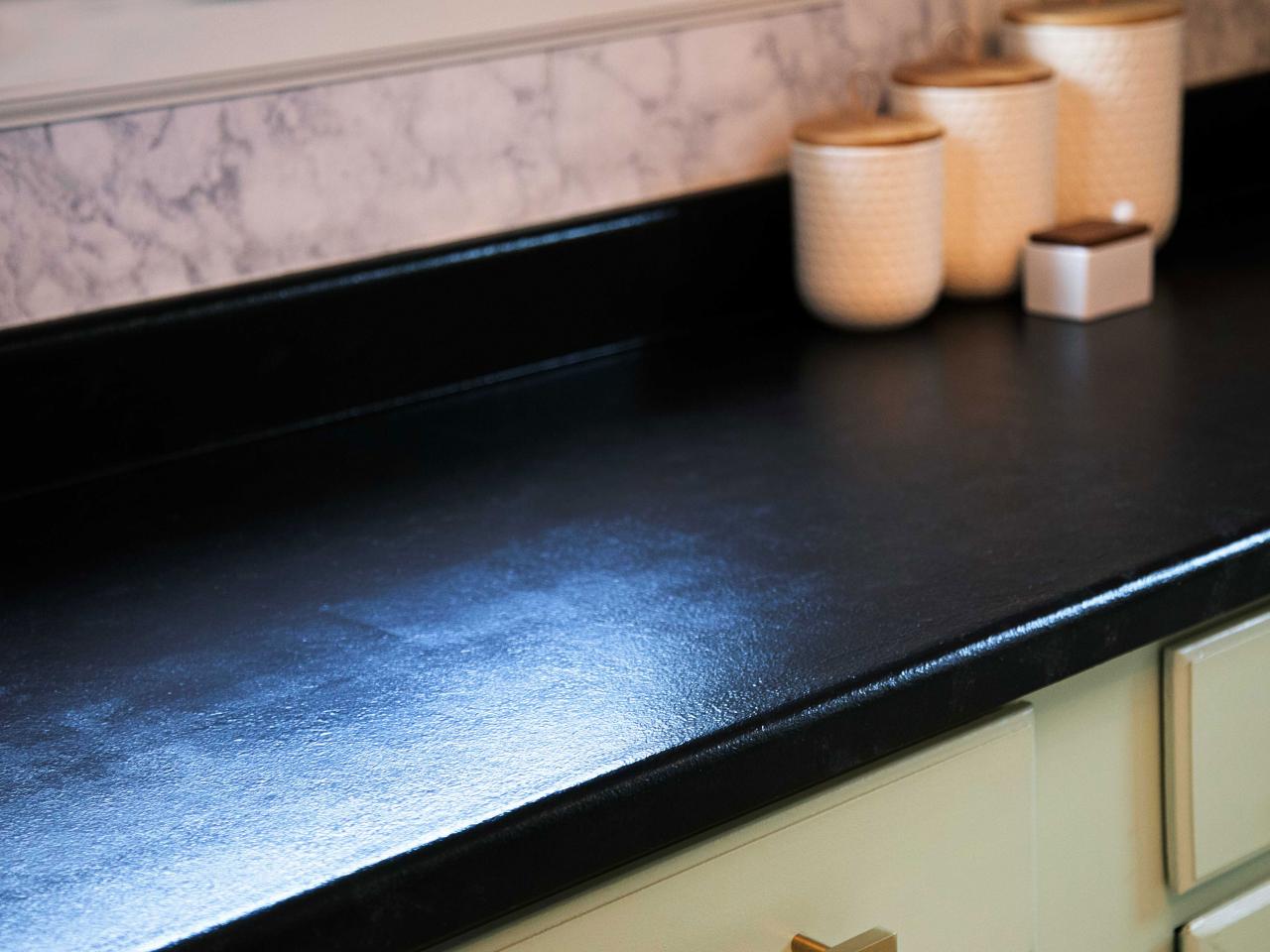
One of the significant advantages of painting your countertops black is the versatility of the color. Black pairs well with nearly any color scheme, allowing you to easily change other aspects of your kitchen decor, such as cabinet hardware, backsplash, or lighting, without worrying about clashing with your countertop. Whether you prefer a bright and airy kitchen or a darker, more dramatic space, black countertops can serve as a neutral anchor in your design.
Another benefit of black countertops is their ability to hide stains and imperfections. While lighter countertops often show every speck of dirt or smudge, black countertops can mask these minor blemishes, making them easier to maintain on a day-to-day basis. However, it’s still essential to keep the surface clean and free of harsh chemicals or abrasive cleaners that could damage the finish over time.
It’s also important to consider the overall lighting in your kitchen when choosing to paint your countertops black. Black countertops absorb light, which can make the space feel darker, especially in kitchens with limited natural light. To counterbalance this, consider adding additional lighting, such as under-cabinet lights or pendant lights, to brighten the room and highlight the sleekness of the black countertops. Reflective surfaces like stainless steel appliances or a glossy backsplash can also help keep the kitchen feeling open and well-lit.
In terms of durability, painted countertops can hold up well with proper care, but they won’t be as resilient as materials like granite or quartz. You’ll need to be cautious when using knives, hot pans, or heavy objects on the surface, as these can scratch or chip the paint. Always use cutting boards, trivets, and placemats to protect the finish and prolong the life of your countertops.
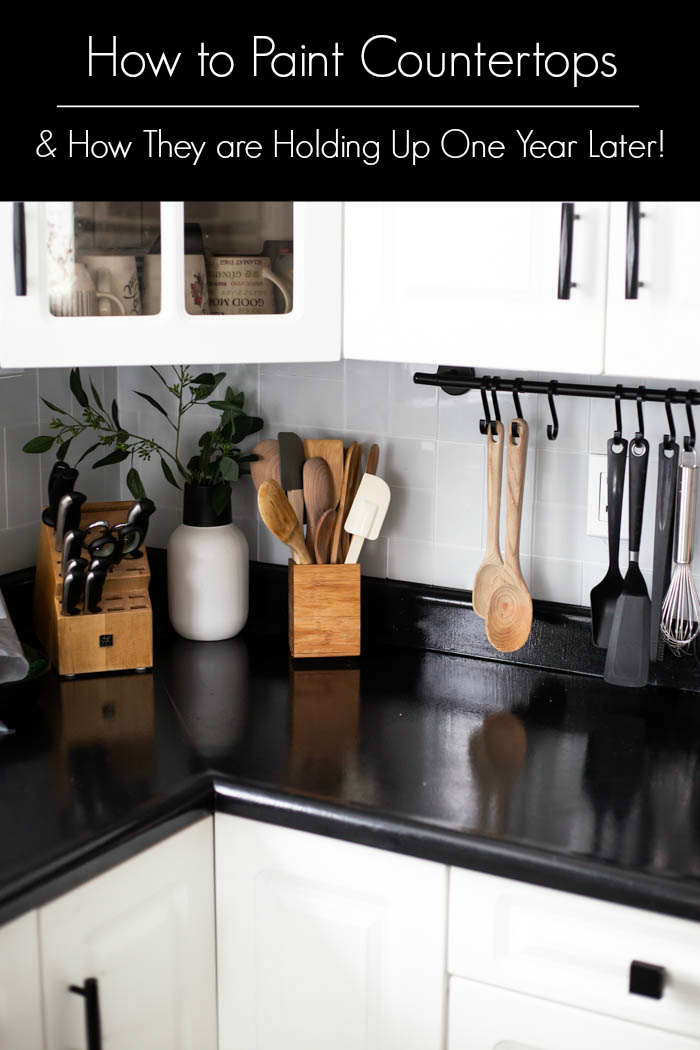
Regular maintenance is essential for keeping your black-painted countertops looking fresh and new. Wipe down the surface daily with a soft cloth and mild soap to remove any food debris or spills. Avoid abrasive sponges or harsh chemicals, as these can damage the paint and sealer. If you notice any small chips or scratches over time, these can often be touched up with a bit of paint and resealed to restore the smooth finish.
For those who love the look of natural stone but can’t afford materials like granite or marble, painting your countertops black can be an affordable alternative. You can even use techniques like faux painting to add subtle veining or texture to mimic the appearance of more expensive materials. Faux finishes can be applied using a sponge or feather brush to create depth and dimension in the paint, giving your countertops a custom, high-end look without the price tag.
Cost is one of the most significant advantages of painting kitchen countertops black. Replacing countertops can be a costly renovation, especially if you’re using materials like stone or solid surfaces. Painting, on the other hand, is an affordable DIY option that allows you to transform the look of your kitchen for a fraction of the cost. Most countertop painting kits or materials are reasonably priced, making it an accessible project for those on a budget.
Finally, if you’re considering selling your home in the future, a kitchen update that includes sleek black countertops can add value and appeal to potential buyers. The kitchen is one of the most important rooms in the home, and small upgrades like painted countertops can make a big impact on the overall perception of the space. By giving your kitchen a modern and cohesive look with black countertops, you can attract buyers who are looking for a stylish, updated home.

Common Mistakes to Avoid
Skipping surface preparation: Failing to properly clean and sand the countertop before painting can lead to poor paint adhesion and a finish that easily chips or peels. Always take the time to thoroughly prep the surface.
Not using the correct primer: Using the wrong type of primer, or skipping primer altogether, can result in paint that doesn’t stick or stains that bleed through. Make sure to use an oil-based primer designed for kitchen surfaces.
Rushing the drying process: Applying additional coats of paint or sealer before the previous layer has fully dried can lead to bubbling, streaking, or uneven color. Be patient and allow each layer to dry completely.
Skipping the sealer: Without a protective topcoat, your painted countertops will be vulnerable to scratches, stains, and damage. Always apply a durable sealer to protect your work.
Using harsh cleaning products: After the countertops are painted, avoid using abrasive or harsh chemicals to clean the surface, as this can strip away the paint and damage the sealer.

Is painting kitchen countertops black a good idea?
Painting countertops black can be a great way to give your kitchen a modern and sophisticated look without the cost of replacement. It’s a DIY-friendly project that allows you to achieve a stylish, updated look for your countertops. However, keep in mind that painted countertops won’t be as durable as materials like granite or quartz, so proper care and maintenance are essential.
What kind of paint should I use for my kitchen countertops?
It’s important to use paint that is designed specifically for countertops or high-traffic surfaces. Epoxy-based paints are ideal because they provide a durable, long-lasting finish that can withstand daily kitchen use. These paints are resistant to heat, moisture, and stains, making them a good choice for kitchen countertops.
How do I prepare my countertop for painting?
Preparation is key to a successful paint job. Start by thoroughly cleaning the countertop with a degreaser to remove any dirt or grease. Then, sand the surface lightly to create a rough texture for the paint to adhere to. Finally, apply a primer to create an even base for the paint.
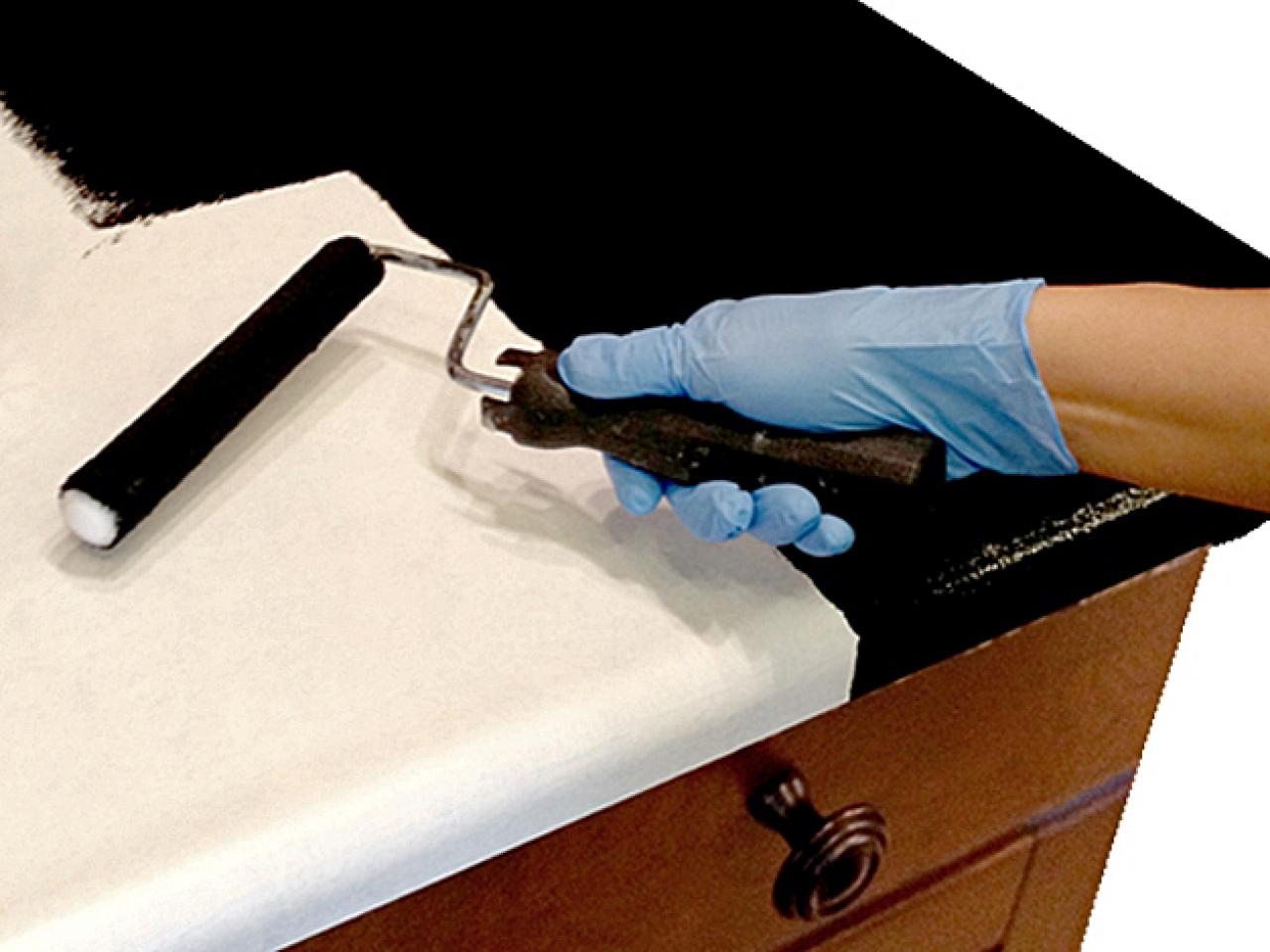
Will painted countertops hold up over time?
Painted countertops can hold up well with the proper care and maintenance. However, they are more prone to scratches and chips than materials like stone or solid surfaces. Using cutting boards, trivets, and placemats will help protect the painted surface and extend its lifespan.
How do I maintain black painted countertops?
To keep your black painted countertops looking their best, clean them regularly with a mild soap and water solution. Avoid using abrasive cleaners or scrubbing pads that could damage the paint. Reapply a clear sealer every few months to maintain the protective finish and address any chips or scratches promptly.
Can I paint laminate countertops black?
Yes, laminate countertops can be painted black, but proper preparation is essential. Laminate surfaces need to be cleaned, sanded, and primed before applying paint. Using a high-quality primer and paint designed for countertops will ensure that the paint adheres properly and lasts longer.
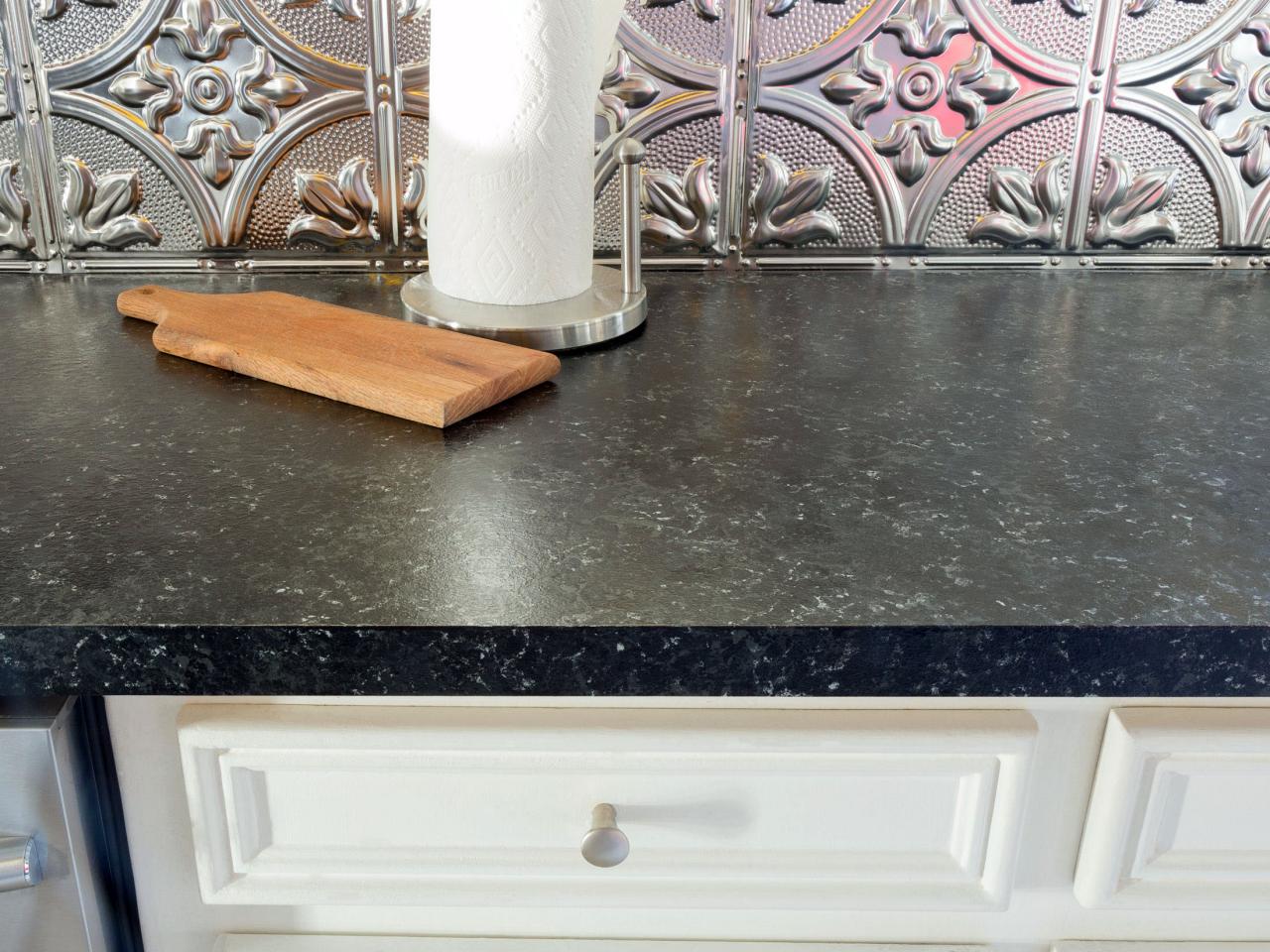
black laminate paint countertops Best Laminate Flooring Reviews

Full Giani Countertop Paint Instructions
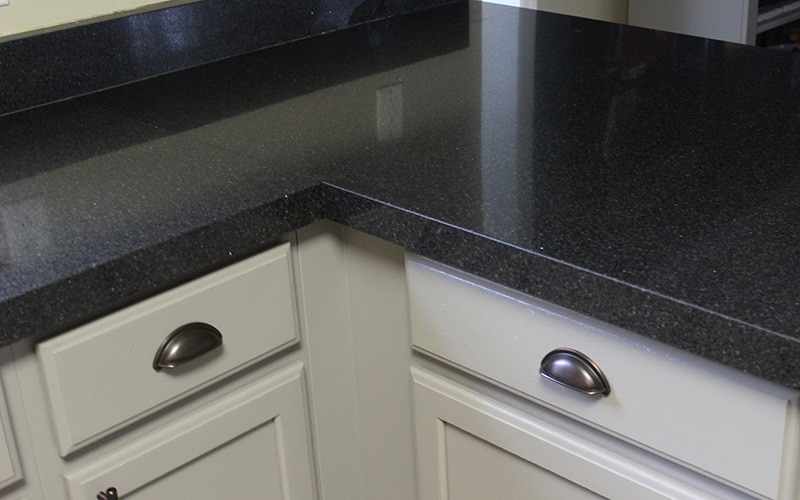
Examples of Black Kitchen Countertops in Beautiful Homes
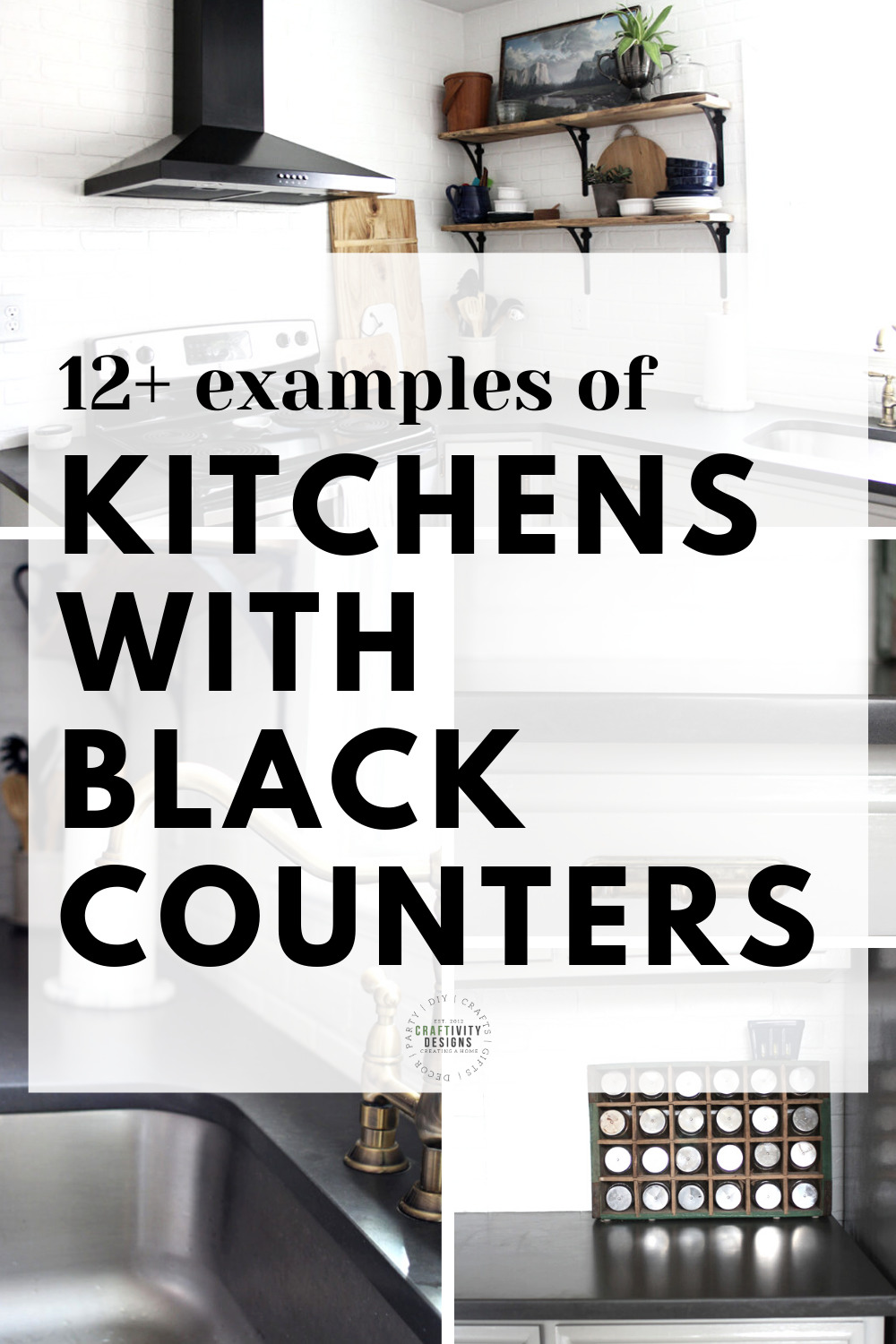
Related articles: